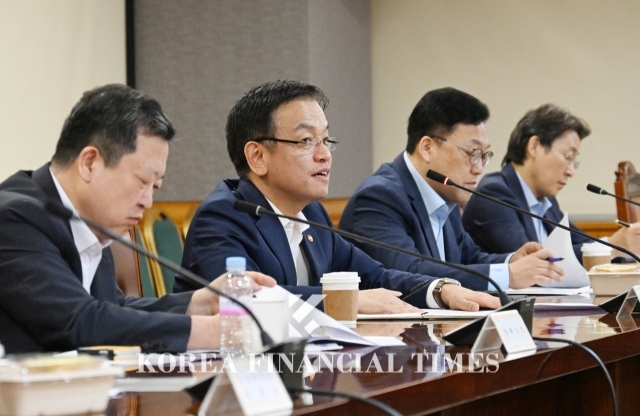
Choi Sang-mok, deputy prime minister and minister of economy and finance, chairs a meeting on urgent macroeconomic and financial issues related to recent domestic and international financial market trends at the Bank of Korea Hall in Jung-gu, Seoul, on June 6.(Source=Ministry of Strategy and Finance)
Choi Sang-mok, Deputy Prime Minister and Minister of Strategy and Finance, held an urgent meeting on macroeconomic and financial issues at the National Banking Association Hall on June 6 with Bank of Korea(BOK) Governor Lee Chang-yong, Chairman of the Financial Services Commission(FSC) Kim Byung-hwan, Financial Supervisory Service(FSS) Governor Lee Bok-hyun, and Chief Economic Advisor Park Chun-seop to review recent domestic and international financial market trends and discuss future responses.
Last week, U.S. stocks began to reflect concerns about a slowdown in the economy following a weak July employment report. This was due to a combination of factors, including earnings concerns and valuation pressure from major big tech companies, the liquidation of yen carry trades following the Bank of Japan's (BOJ) interest rate hike, and renewed unrest in the Middle East.
Key players at the meeting said that the lack of assessment of the U.S. market has led to further damage to Asian equities. There was a sense of overreaction to the current events.
Over the past five days, the Kospi has dropped 8.77% from the previous trading day, and Japan's Nikkei has plunged 12.40%.
However, the market's reaction is unusual. In the past, market shocks have affected real assets, stocks, bonds, and foreign exchange simultaneously, but this time, only the stock market showed a major correction.
In addition, the foreign exchange and money markets have been performing well as Korea's economy is gradually showing signs of recovery. The government and the BOK agreed that the BOK has sufficient policy response capacity to deal with market volatility due to external shocks.
Choi said the government plans to continue operating a 24-hour joint inspection system as external uncertainties remain high, including the spread of geopolitical unrest in the Middle East and the US presidential election. In addition, if market volatility escalates, they will closely coordinate according to the situation-specific response plan. The participants were urged to maintain the response system of related organizations so that market stabilization measures can be implemented quickly if necessary.
Meanwhile, the participants agreed that the government will continue to pursue tasks to strengthen Korea's capital and foreign exchange markets and expand the external safety net, such as corporate valuation programs, advanced foreign exchange and bond markets, and supply chain expansion.
Lee Sungkyu (lsk0603@fntimes.com)





























![[DCM] "한화오션, 공모채 경쟁률 8.4대 1… 효성첨단소재도 목표액 초과"](https://cfnimage.commutil.kr/phpwas/restmb_setimgmake.php?pp=006&w=69&h=45&m=5&simg=2024112210235807058141825007d12411124362.jpg&nmt=18)


![[현장] 베일 벗은 HDC현산 '서울원 아이파크', 평일 오전에 2천명 넘는 인파](https://cfnimage.commutil.kr/phpwas/restmb_setimgmake.php?pp=006&w=69&h=45&m=5&simg=20241122164905042485e6e69892f203229150117.jpg&nmt=18)



















![[카드뉴스] 국립생태원과 함께 환경보호 활동 강화하는 KT&G](https://cfnimage.commutil.kr/phpwas/restmb_setimgmake.php?pp=006&w=298&h=298&m=1&simg=202403221529138957c1c16452b0175114235199_0.png&nmt=18)
![[카드뉴스] 신생아 특례 대출 조건, 한도, 금리, 신청방법 등 총정리...연 1%대, 최대 5억](https://cfnimage.commutil.kr/phpwas/restmb_setimgmake.php?pp=006&w=298&h=298&m=1&simg=20240131105228940de68fcbb35175114235199_0.jpg&nmt=18)
![[카드뉴스] 어닝시즌은 ‘실적발표기간’으로](https://cfnimage.commutil.kr/phpwas/restmb_setimgmake.php?pp=006&w=298&h=298&m=1&simg=202311301105084674de68fcbb35175114235199_0.png&nmt=18)
![[신간] 사모펀드 투자와 경영의 비밀](https://cfnimage.commutil.kr/phpwas/restmb_setimgmake.php?pp=006&w=81&h=123&m=5&simg=2024102809331308730f8caa4a5ce175114235199.jpg&nmt=18)
![[신간]퍼스널브랜딩, 문학에서 길을 찾다](https://cfnimage.commutil.kr/phpwas/restmb_setimgmake.php?pp=006&w=81&h=123&m=5&simg=2024102214123606876f8caa4a5ce175114235199.jpg&nmt=18)
![[서평] 추세 매매의 대가들...추세추종 투자전략의 대가 14인 인터뷰](https://cfnimage.commutil.kr/phpwas/restmb_setimgmake.php?pp=006&w=81&h=123&m=5&simg=2023102410444004986c1c16452b0175114235199.jpg&nmt=18)

![[신간] 김국주 전 제주은행장, ‘나는 시간을 그린다 1·2’ 에세이 출간](https://cfnimage.commutil.kr/phpwas/restmb_setimgmake.php?pp=006&w=81&h=123&m=5&simg=2024111517430908074c1c16452b012411124362.jpg&nmt=18)








